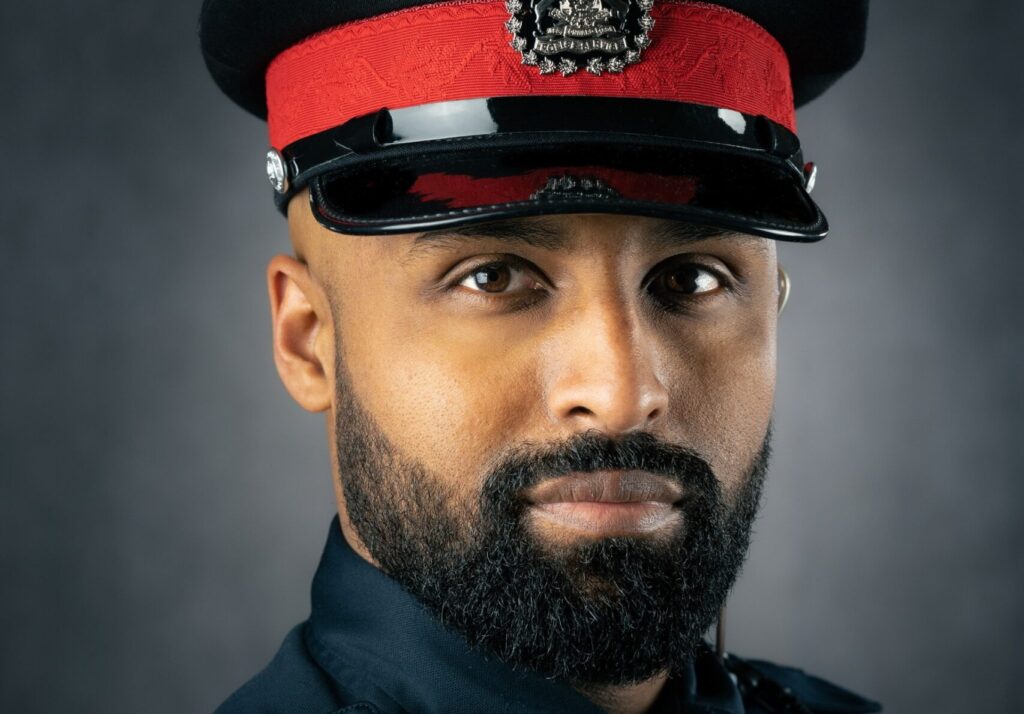
Features
Opinion
More than a rank: Through the eyes of an actor
May 15, 2023 By Jameel Ali
 Photo credit: Jameel Ali
Photo credit: Jameel Ali What makes a good sergeant?
Depending on the era from which your perception of policing is based—whether it be old school policing where members were filled with “piss and vinegar”, ready to “lay down the law”, or new age policing where a raised voice is considered an “assault on feelings”—our answers may drastically vary.
When considering the characteristics of a good leader, or a sergeant to be specific, some conflate arrogance and unkindness with confident assertion and decisiveness. Empathy and patience are coalesced with weakness and fragility. We tend to cheapen the fundamental characteristics of a competent leader when we do not possess the dexterity of character to emulate them.
Throughout my eight-year career with the Calgary Police Service, I’ve had the opportunity to work with outstanding sergeants who have invested in my professional development. Through mentorship and leading by a positive example, they have impacted my perception of how vital it is to have decent people in supervisory positions. As many of us have, I have also witnessed sergeants, and actors alike, of the opposite disposition. Here, I’m referring to the sergeants who were once constables that saw the job as just a paycheque, and a promotion as just a bigger paycheque. Then there are sergeants who wield their rank as a bludgeon against their subordinates, oftentimes flaunting the liberties the rank provides while abdicating the responsibility it demands. It is a shame—one that has real consequences that effect real people.
Tracy Brower, PhD, contributor to Forbes, recently published an article outlining the major impact managers have on mental health. I was astounded to see that new data suggests that 70 per cent of people agree that their manager has a more substantial impact on their mental health than their doctors or therapists. This sobering data adds a new dynamic to what it means to be a sergeant. Until I was given a long-term acting position, I could only theorize what the position involved. After recently being given the opportunity to bear the weight of this great responsibility, I can finally conceptualize what a remarkable opportunity it is to have a meaningful impact on our brothers and sisters in blue.
I soon recognized that managing the street, although daunting at first and not being without its own set of complex challenges, is the most basic aspect of the role. The interpersonal piece, at least within a patrol capacity, is what will make or break a team leader. How a sergeant conducts themself—their words, credibility, dependability, approachability and competence—is closely observed by their team. Though the sergeant is responsible for the moral tenor of the team, a unified willingness to abide by a code of collaboration is also required by the members under a sergeant’s command.
If the study cited earlier bares any truth, then the mental health, and by extension, quality of life of our police membership, is heavily contingent on the constitution of leaders promoted. To take it a step further, the quality and moral tenor of our executive team is directly linked to the wellness of the service at large. The supervisory role is more than a rank—it is the oil that keeps the engine protected, healthy and running—and sometimes it requires change. It is incumbent on our service to utilize a system of promotion that facilitates the elevation of ethical leaders. Unfortunately, the service is unable to protect the membership from the frequent tornadoes of societal backlash coming from a small, loud minority; however, it is entirely within the power of our leadership to protect the mental wellness of the membership through an intentional, common-sense, approach to leader selection and support.
Reference
- Brower, Tracy. “Managers Have Major Impact On Mental Health: How To Lead For Wellbeing.” Forbes. Jan. 2023. Accessed at https://www.forbes.com/sites/tracybrower/2023/01/29/managers-have-major-impact-on-mental-health-how-to-lead-for-wellbeing/?sh=2ce96b62ec19.
Jameel Ali is a sworn police officer with the Calgary Police Service with just under a decade of patrol experience, and is currently assigned to an acting sergeant position. He is an advocate for better equipping frontline police officers with the tools needed, both tangible and otherwise, to keep their communities safe while also protecting their own physical and mental health. He can be contacted at pol5280@calgarypolice.ca.
Print this page